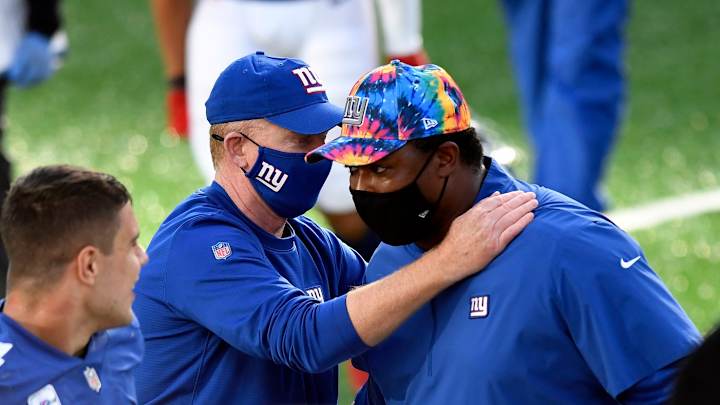How Giants Defense's Disguises Have Affected Opposing Quarterbacks

There are many things to like about the Giants defense this year, from the creativity of the schemes to the execution.
One thing in particular that has emerged as a positive trend for this defensive unit has been its tendency to confuse opposing quarterbacks by deploying various pre-snap looks that brilliantly disguise what the Giants plan to run.
This is evident by the difference in the various quarterbacks' average time to throw (ATtT), which, as the table (data from Pro Football Focus) below shows, indicates how quarterbacks have mostly been holding onto the ball longer against the Giants.
As a result, opposing quarterbacks hold onto the ball longer when they drop back to pass against the Giants versus their season average in the games leading up to their meeting with the Giants, as illustrated in the table below (data from Pro Football Focus).

This data reflects the ATtT (in seconds) the quarterback logged before facing the Giants and then the AttT (in seconds) against the Giants.
This data shows that most of the quarterbacks faced took longer to throw the ball against the Giants. So that one doesn't mistakenly think that the extended time is the lone result of the quarterback having more time to throw against an ineffective pass rush, I also included the number of pressures (per PFF) that the Giants managed to get against each quarterback.
While in some cases, a quarterback might have had extra time to throw, it's fair to conclude that the Giants' disguising of their pre-snap coverages has "persuaded" quarterbacks to hold the ball a little longer. That is how the Giants have generated a pass rush despite not having a blue goose pass rusher.
This style of defense has been fun for the Giants and, in particular, safety Logan Ryan.
"I don’t even know if I was on the screen (against Seattle)," he said with a chuckle. "I was so deep and doing so many different things to make [Seahawks QB Russell Wilson] hold the ball an extra second, to make him confused on what we were doing, give our pass rush extra time, give our coverage a little extra time."
Here's a perfect example of what Ryan was talking about in that game. This play came in the first quarter on a 3rd-and-4 with 10:09 left.
You can see the Giants' defensive front milling around in an amoeba defense, which is another way of saying that the front is moving around so much before the snap to confuse the quarterback.
By the time the ball is snapped, note how different the defensive formation looks from its pre-snap state.
Also, watch Wilson during the pre-snap read. It's clear that he has no idea what he's looking at, as at one point, he drops his arms and leans in to take another look at what the Giants are showing.
The Giants do such a good job of disguising what they are doing that Wilson not only has to guess in terms of calling out the correct protection scheme, when the ball is snapped, all four of his vertical receiving targets end up being covered man-to-man.
The only option he has at this point is a running back in the flat, which you can see in the lower half of the screen. But because Wilson's back is to his safety valve, he doesn't see him.

The Giants, meanwhile, add a little flourish at the end where linebacker Tae Crowder does a little twist to the inside and finds himself with a wide-open gap.
He shoots through that gap and drops Wilson for a huge 11-yard sack on third down on what was a beautifully designed and executed defensive play that completely flummoxed Wilson.
